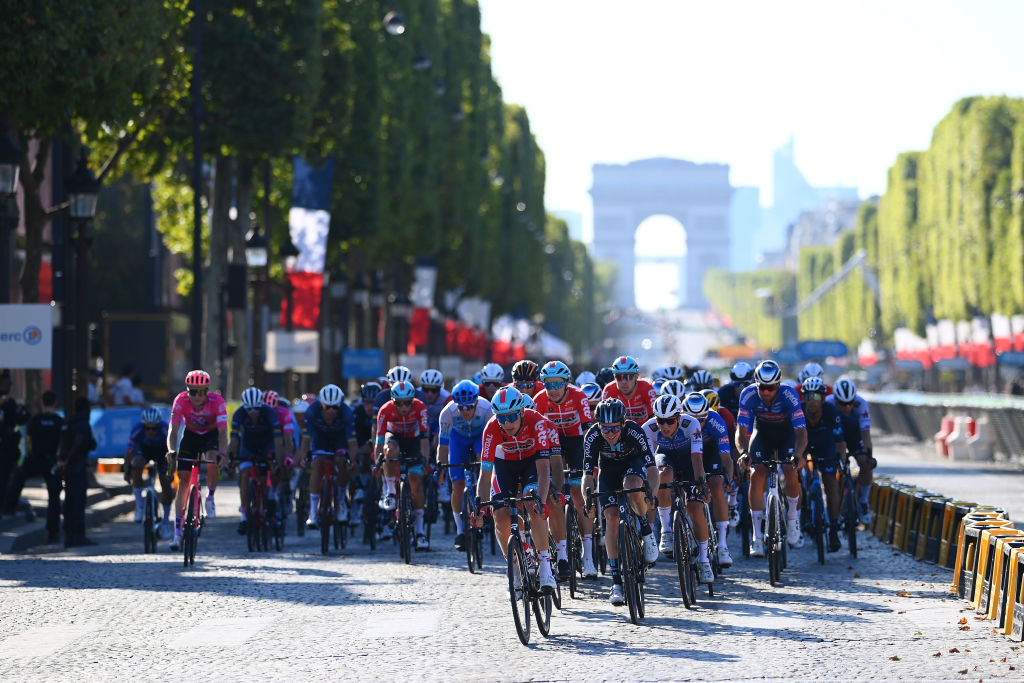
Plans for the 2023 Tour de France internal team race comms to be broadcast in a semi-live format are set to go ahead but only for 17 of the 22 squads present in this year’s race.
According to L’Équipe, race radio communications between sports directors and their eight riders will be broadcast during all the stages, but in a delayed format and after monitoring by a specially delegated group of six organisation officials to prevent ‘eavesdropping’ by rival squads on other teams’ plans.
“We wish to continue to innovate in technology,” ASO media director Julien Goupil told the newspaper. The practice has been a standard part of Formula 1 broadcasts for over 20 years and was given a trial run last year in the Tour de France Femmes.
However, not all teams are on board with the idea, with Groupama-FDJ’s team manager Marc Madiot one particularly outspoken opponent. Cofidis, Movistar, Jayco-AIUIa and Alpecin-Deceuninck will also not permit access to their race comms.
Goupil explained to L’Equipe that he felt the listening into race radios formed part of a historic process of development of access to ‘inside information’ during a stage.
“We first had live tracking of riders and onboard cameras in 2015, then we had 3D-Live coverage of riders groups in 2018. We want each innovation to form part of the viewers’ experience. If there’s a crash or an attack, it’s good to know what’s being said.”
The two-year deal will see each participating team paid €5,000 and will be available to all TV channels broadcasting the Tour willing to pay for the access.
Not that all teams will be heard, with Marc Madiot asking L’Equipe rhetorically, “If it’s a question of hearing ‘when you turn right, there’ll be a crosswind in two kilometres, where’s the interest?”
“And if you tell a rider ‘take the left-hand side of a roundabout’ and he goes right, it’ll make you look like a dick.”
“On the other hand, if you get pissed off with somebody because you’re 15th in the line of team cars behind the bunch and the bidons take a long time to get to your riders, when you get to the finish you’ll have ten or 15 TV camera crews wanting to ask you about why you got pissed off.”
Madiot insisted that the right to intimacy ought to be maintained, although other sports directors argued that allowing race comms to be heard was a question of moving with the times following the Netflix series as well as allowing for greater transparency. Madiot, however, countered by arguing that the Netflix series was broadcast almost a year after the Tour.
Unofficial hacking of other teams' race radio comms has long formed part of the urban legends of the Tour and other races.
In the 2001 Tour de France, US Postal’s lead DS Johan Bruyneel famously resorted to radio-ing through false messages about Lance Armstrong being in a bad way, guessing (rightly) that his rival teams would be listening in and then using that to catch them unawares in the stage.
Similar race radio tactics came into play in the 2001 Vuelta a España, Igor Gonzalez de Galdeano won the race’s fastest-ever stage into Zaragoza, with an average speed of 55.176km. Gonzalez was told to ‘give it to them hard’ - attack - in his native Basque over the radio, as his sports director Manolo Saiz realised that most of his rivals, even if they were listening in, did not speak that language.





